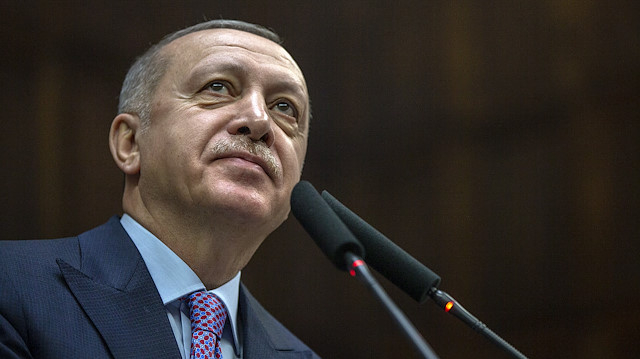
President says Turkey will go after terrorists wherever they are, as allowed under 1998 agreement
Turkey will never compromise on the Sochi deal on embattled Idlib, Syria and it expects the deal to be implemented, said the country's president on Wednesday.
Speaking to reporters while returning from Azerbaijan, Recep Tayyip Erdogan said, “We want whatever the Sochi deal contains. We cannot compromise on this issue, and whatever is necessary needs to be done.”
On his phone calls last week with Russian President Vladimir Putin, German Chancellor Angela Merkel, and French President Emmanuel Macron, in which the leaders agreed on a meeting on Idlib for March 5, Erdogan said the venue of the meeting “will probably be Istanbul.”
He said whether the meetings would be bilateral or quadrilateral would be agreed on later.
Since Turkey and Russia reached a deal on Idlib in 2018 under which acts of aggression are supposed to be prohibited there, over 1,300 civilians have been killed in the de-escalation zone.
Following intense attacks by the Assad regime and its allies, over a million Syrians have flocked towards the Turkish border.
Since the eruption of the bloody civil war in Syria in 2011, Turkey has taken in some 3.7 million fleeing Syrians, making Turkey the world’s top refugee-hosting country.
Rebuffing critics who call Turkey’s presence in northern Syria – across the Turkish border – an “invasion,” Erdogan pointed to 1998 Adana Agreement between Turkey and the then-Syrian government.
“Turkey is here [in Syria] based on the Adana deal,” he said. “What is the process in Adana deal? You will follow the terror groups wherever they go. This is what Turkey is doing, and right now we are going after the terror organizations,” Erdogan said, adding that these terror groups are PKK, YPG, PYD, Daesh/ISIS and other terror groups.
Since 2016, Turkey has launched a trio of successful anti-terrorist operations across its border into northern Syria to prevent the formation of a terror corridor and enable peaceful settlement by locals: Operations Euphrates Shield (2016), Olive Branch (2018), and Peace Spring (October 2019).
Signed in Turkey’s southern city of Adana in 1998, the agreement was aimed at easing Ankara’s concerns over the presence of the PKK terror group in Syria. In its decades-long terror campaign, the PKK has killed 40,000 people in Turkey, including women, children and infants. It is also listed as a terrorist organization by Turkey, the U.S. and the European Union. The YPG is the PKK’s branch in Syria.
Under the agreement, Syria recognized the PKK as a terrorist group and banned all its activities and those of its affiliated groups within the country’s territory.
The Syrian regime guaranteed that it would not permit any activity "which emanates from its territory aimed at jeopardizing the security and stability of Turkey."




